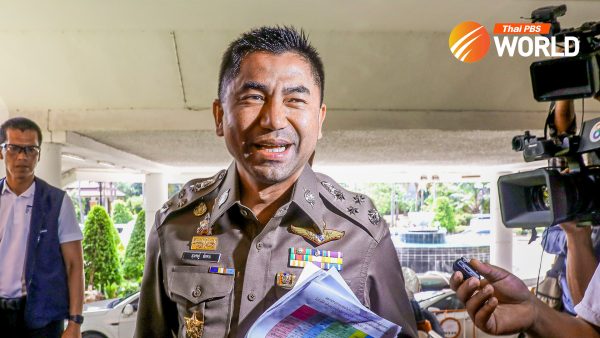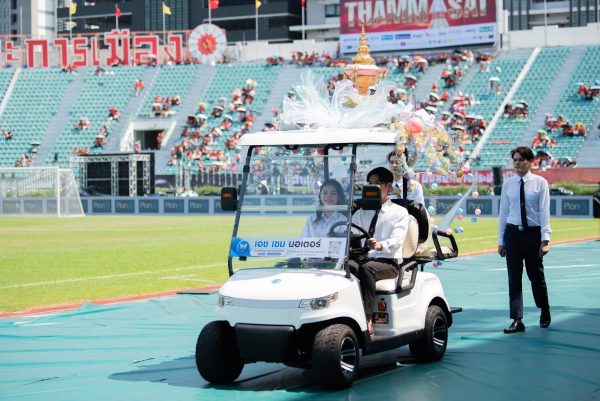How two coups shaped Gen-Z political beliefs

In the second of its series on the outbreak of campus activism sparked by the dissolution of Future Forward Party, ThaiPBS World’s Political Desk takes a look at what shapes the political thinking of the young generation of Thais.
The past few weeks have seen students reacting to the recent dissolution of the Future Forward Party by sparking off a nationwide resurgence of Thailand’s campus protest movement.
The political momentum has suddenly tipped towards the youthful end of society, underlining the fact that the current crop of university students witnessed two coups and associated political turmoil during their childhood. This gives them all a shared political background.
These young people may not be rallying under the same banner. Neither are they organising their protests at the same time or the same venue. Yet, politically active students are now clearly moving in the same direction and to the same tune, guided by shared beliefs and goals.
“What we have is a collective leadership. Under the present circumstances, we probably don’t want to see individuals stand out and become targets,” a university student told the Thai PBS forum last Thursday, as she sat alongside fellow student representatives from nine universities.
While declaring that the dissolution of the Future Forward was the trigger point, these youngsters insisted they harboured higher causes and goals – among them real reforms, generational change for the better, and better basic rights and protections for people.
Youngsters who have chosen to join the fray are bound by similar political convictions. These beliefs, after all, have been shaped by the same key political incidents experienced in Thailand over the past two decades.
Current university students have memories of the 2006 coup, mass political demonstrations – first by the red-shirt United Front for Democracy against Dictatorship and then by the People’s Democratic Reform Committee (PDRC). Then came the 2014 coup whose legacy is still with us. Such upheavals are simply too big to ignore.
That’s why many of today’s students – dubbed Generation Z – have paid serious attention to politics, developed their own convictions, and are now standing up for their chosen ideology. They want freedom, active political participation, democracy and the right to shape their own future.
And quite a few had resolved to fight for what they believe in, taking the path of youthful activism, long before the dissolution of Future Forward on February 21. ThaiPBS World recently talked to two of the high-profile members of the new movement.
Related stories:
Student movements blaze back, but for how long?
Popular party’s disbandment sparks information war
Parit Chiwarak, 21, is a co-founder and former president of the Student of Union of Thailand (SUT). Widely known by his nickname Penguin, Parit first attracted the media limelight at the tender age of 16. While studying at the Triamudom Suksa School, he served as secretary-general for a group named Education for the Liberation of Siam and unfurled a banner in front of Prime Minister General Prayut Chan-o-cha in 2015 asking how Thai children could be kept from the path of corruption.
A year later, he won widespread support for speaking up against a draft constitution which threatened to deprive children of their 15 years of free education.
During his studies at Thammasat University’s Faculty of Political Science, he has become more involved in politics. He has often been accused of organising illegal rallies. But the more Parit feels harassed and abused by authorities, the more his spirit of political activism grows.
In his view, Thais had their future stolen in 2014 – he’s referring, of course, to the military coup of that year and the events that followed.
Jutatip Sirikhan, 23, president of the Student of Union of Thailand (SUT), has been interested in politics since she was at primary school. Born and raised in the northeastern province of Amnat Charoen, Jutatip’s interest has much to do with the 2006 coup that ousted the then-hugely popular Thai Rak Thai Party from power.
A few years later, she saw the yellow-shirt and red-shirt protests spill onto streets. By the time she entered high school, the PDRC was unfurling its banners. Then came the second coup in her lifetime, in 2014.
The latest military power seizure meant she had to wait until last year till she could cast her ballot at a general election for the first time. While studying at Thammasat University’s Faculty of Liberal Arts, Jutatip made a name for herself by speaking up for women’s rights.
But early this year, she decided to take the helm of the SUT and is now playing a key role in student rallies. Under Jutatip’s leadership, the SUT became the first student group to stage a protest against the dissolution of the Future Forward Party, just one day after the court verdict was issued.






